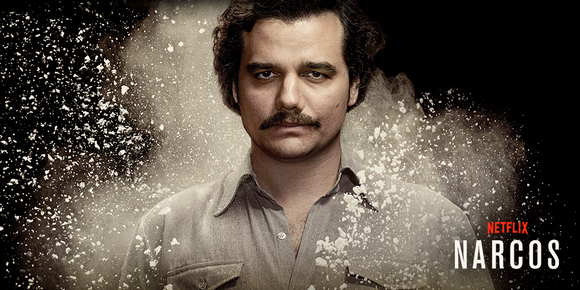In the words of Rick James, “Cocaine is a hell of a drug.” The addictive quality of coke comes from it releasing dopamine — which causes a sense of euphoria and an elevation in blood pressure and heart rate. If you’ve ever suffered through a conversation with a coked up douchebag, you know why comedian Denis Leary’s joke about coke would be so spot on. If you don’t remember it, it goes a little something like this:
“Yeah, I’d like to do some cocaine. I’d like to do a drug that makes my penis small, makes my nose bleed, makes my heart explode, and sucks all my money out of the bank.”
If you’re a capitalist looking for a product that will ensure you have a vacuum tube connected to people’s bank accounts, cocaine is the Golden Ticket. Colombian drug trafficker Pablo Escobar quickly learned that anyone with money to burn would love a drug like cocaine, and he built an empire with coke money that eclipsed the GDP of many countries. With the Netflix series, “Narcos,” we get to follow the rise of Escobar from middling smuggler of TVs, marijuana, cigarettes and booze to kingpin of the MedellÁn drug cartel. While the series does center on Escobar, it also pits his rise to power with efforts to capture, jail, or kill him by the DEA and the Colombian government. Along the way, we see how a man who comes from nothing has a very sophisticated understanding of politics and power. Mostly, he knows what motivates men, and he uses the usual tools to entice or bully them. In a way, it’s really astonishing to see how a drug lord can wield so much power, but Escobar understood early on that the poor look for a savior, and the powerful are afraid of violence that terrorizes their country. He is unafraid to use whatever he needs to both build and sustain his empire. So he gives out cash to poor people (he has over five million dollars coming in every day), builds soccer fields, sponsors teams, and does a number of other things to show he’s a man of the people. But where he crosses the proverbial line is when he resorts to terrorism, kidnapping, and murder in an effort to keep him from being extradited to the U.S. — where he would spend 23 hours a day for the rest of his life in a jail cell. That sets up the big showdown between the Colombian government (with more than a little help from the U.S.), Escobar, and the rival Cali cartel. Quite a lot of blood is spilled, innocents die, corruption abounds, and the government (both the U.S. and Colombian) are very flat-footed at times trying to either destroy Escobar or negotiate with him.
Escobar’s almost Machiavellian aphorism “War leads to peace” becomes his modus operandi in dealing with rivals — and for the most part, it works. His reign of terror almost brings Colombia’s government to the brink of capitulation. However, Escobar overplays his hand in his belief that he can use violence to get his way on whatever he wants — which leads to a breaking point as the series ends on a bit of a cliffhanger.
Wagner Moura’s portrayal of Escobar is sly. With his pot belly and quiet ways, Escobar looks like Bill Murray playing a slacker character. But brewing beneath his rather unassuming exterior, is a brash, psychotic, and often paranoid man who showers his immediate family with love and affection while never thinking twice about blowing up buildings, an airliner, or even shooting small children.
Boyd Holbrook and Pedro Pascal play DEA agents Steve Murphy and Javier PeÁ±a who are trying to capture or kill Escobar, and they bring to their roles both The White Savior (who’s not really a savior at all) and a double-dealing agent. There are black hats and white hats in the story, but sometimes it’s not clear who is wearing which among the Americans and Colombian government officials. The murkiness of who the heroes and villains are adds to the compelling nature of the show.
Overall, “Narcos” is a winner — even if you’re fans of the gangster genre and have seen a version of this story before. Whether it’s “Scarface” or “Goodfellas,” or any of the other lesser known films, you know the drill: “In this country, you gotta make the money first. Then when you get the money, you get the power. Then when you get the power, then you get the woman.” With Escobar, women weren’t so much of a motivation, but power sure was. And the problem with the brutal type of power Escobar lived by is that there will always be someone with a bigger gun willing to take it away from you.






Comments